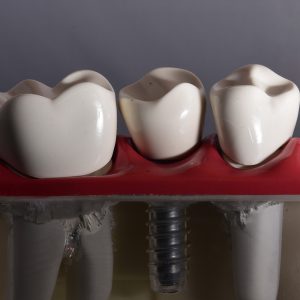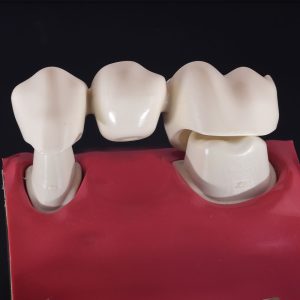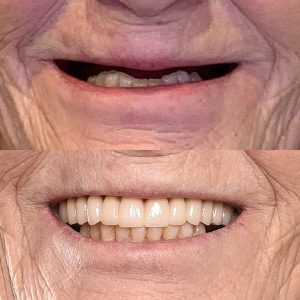Dental Bridges vs. Permanent Implants: Making the Right Choice for Your Smile
Last updated Thursday, August 31st, 2023
Get a Customized Dental Bridge or Implant Based On Your Needs
A smile is a language everyone around the world understands and loves. A healthy set of teeth is the secret to a smile that makes a great first impression. So losing your teeth can steal your beautiful smile, and your ability to chew food properly, and sabotage your confidence.
It’s one thing to lose teeth naturally with age and another to lose them when you’re young by neglecting them. But it doesn’t mean you have to suffer for your mistakes all your life. It’s time to go beyond precautions and seek a dental intervention.
Dr. Mansoor has restored the natural smiles of patients who lost their teeth through the power of dental bridges and dental implants.
Dental bridges are false teeth that are supported by the teeth adjacent to your missing tooth. You can use them to cover a single missing tooth or fill in a wider gap in case of multiple missing teeth.
Dental implants are artificial tooth roots screwed into your jawbone like anchors. They are used as a support system for your new crown or dental bridge.
Dr. Mansoor will do an in-depth examination of your dental conditions and recommend the best treatment option based on:
- Your number of missing teeth
- Your overall health
- Your budget and time limitations
In this article, we’ll explore the pros and cons of each solution and help you pick the perfect option to fix your dental issues.
Ready to Get Your Beautiful Smile?
CALL (480) 780-1511
Take control of your life and give yourself the smile you deserve! With our New Patient Special, the time to book your appointment for your dental implants is now!
Dental Implants: A Lifelong Solution for Tooth Replacement

There are bones, ligaments, and nerves connected to it. So if you lose one tooth, the neighboring area around it starts weakening too. Lose multiple teeth and you put your dental deterioration on fast forward.
A dental implant is like a new tooth root that creates a stable foundation for your tooth replacement. It’s shaped like a screw that is implanted into your jawbone. Eventually, new bone grows around the implant site and the implant fully fuses into your jawbone. Once your dentist determines it to be secure, a crown will be screwed on top of the implant.
It becomes a long-lasting solution that needs minimal repair for the rest of your life. Why? Because you’ve treated the problem from the root level.
Just keep up your regular oral hygiene routine to ensure the area near the implant is clean, and visit your dentist for a check-up every six months.
Advantages of Dental Implants over Dental Bridges
Here are the biggest advantages of dental implants over dental bridges:
- Implants require minimal maintenance and can easily last for 15-20 years
- They have a 97 percent 10-year success rate
- Implants maximize your chewing power because of their strong roots
- Implants do not affect adjacent teeth
- Implants prevent bone and gum loss
- Implants feel and function like natural teeth
- They can retain their natural-looking appearance for much longer
Dental Implants vs. Bridges: Costs and Considerations
Getting dental bridges is a faster and easier procedure than getting implants. However, it’s not a permanent solution and will need to be replaced within 5-7 years. Food will also build up underneath the teeth and has to be cleaned constantly.
The American Dental Association reported that the average cost for dental bridges ranges from $500 to $1200. Getting a crown that attaches your tooth to its adjacent teeth will cost another $500 to $2500. On the other hand, dental implants cost between $3000 to $4500 per tooth and are not attached to any adjacent teeth and will be much easier to clean than a dental bridge. Both options will be covered with your insurance plan but its best if you call your insurance ahead to understand your coverage.
Here are a few important factors that determine the price of your dental bridges:
- Number of missing teeth you’re replacing
- Type of bridge
- The material used
- Procedure complexity and treatment time
- Location of the dental office
Dental Implants: Maintaining Healthy Teeth and Bone
When we say dental implants require minimal maintenance, it doesn’t mean you don’t require any oral healthcare for your new tooth. It doesn’t make your gums and the rest of your teeth disease-proof. You just have to stick to a healthy oral hygiene routine without worrying about doing something extra.
Make room for regular dental check-ups in your schedule so that there’s no room for decay or infections in your teeth. A well-maintained dental implant can last as long as 25 years. They’ll also prevent your bones and tissues from degenerating early by giving them a strong support system.
Neglecting oral hygiene can lead to infections or bleeding around the implant sites. It will accelerate bone loss around the area and eventually force you to remove the implant.
Dental Bridges: A Quick Solution with Potential Limitations
A dental bridge is an artificial tooth used to fill a gap between adjacent teeth. It is held in place by the teeth on either side of the gap. You can use a variety of materials like porcelain, zirconium, gold, and other resins for your dental bridge.
It’s a faster and cheaper solution to cover up missing teeth, but not a long-lasting one. You’ll have to get them replaced every 5-7 years. Dental bridges put pressure on your adjacent teeth and you may face more tooth decay in the surrounding area.
They also start losing their natural appearance over the years. So you may need to invest in some dental veneer work periodically.
Who Should Consider Dental Implants?
Here are some of the conditions that may qualify you for a dental implant procedure:
- You’ve reached adulthood and have a fully developed jaw.
- Your bone volume can adequately hold these implants in place. You may need to get bone grafting surgery to fix this issue before receiving your implant.
- You have healthy gums
- You have a great oral hygiene routine with no present infections
- You are not an active smoker or tobacco consumer
- You don’t have teeth clenching and grinding problems
Dental Bridges: When They May Be Preferable

Only an experienced dentist can recommend the right option based on the following factors:
- Number of missing teeth-depending on how many missing teeth, a bridge may not be strong enough to support more than 4 teeth.
- Health conditions– You are not a good candidate for Implants if you are a smoker, has uncontrolled diabetes, had radiation to your head and neck, or have osteoporosis.
- Time- Dental bridges can be installed within a couple of weeks. You may have to wait two to six months for your implant site to fully recover before getting the permanent crowns installed on top of the implants.
Dental Implants: The Preferred Choice for Long-Term Dental Health
Dental implants are as close as you can get to a real tooth – functionally and aesthetically.
They build the perfect support system for your jawbone, gum tissues, and your adjacent teeth. This prevents the area around your missing teeth from deteriorating. So you can cut down on a lot of unnecessary dental maintenance work over the next few years. They can easily last around 15-20 years with a basic oral hygiene routine.
Implants stand alone and don’t require any teeth for anchorage.
Teeth Loss: Leading Causes and Consequences
Gum disease and cavities are the leading causes of tooth loss across the world. But who are the real culprits? It could be aging, poor diet, bone loss, smoking, or some other health conditions.
You can’t point a finger at them and escape the consequences.
Receding gums, cavities, and pain are some of the early warning signs Mother Nature gives us long before our tooth falls.
Here are some of the dangerous consequences of untreated tooth loss:
- Jaw pain
- Bone loss
- Sunken face
- Overgrowth of opposing teeth
- Trouble chewing your food properly and having acid reflux
- Spacing of adjacent teeth
- Periodontal disease
- Increased risk of hypertension, stroke, heart disease, dementia, and cancer
The Importance of Replacing Missing Teeth
Delaying your treatment only makes things worse. Removing your troublesome tooth isn’t going to end your problems either. When you lose a tooth, it affects the gum tissue, bones, and adjacent teeth supporting it.
Getting a dental implant will restore your perfect smile and a whole lot more. It increases your bite force to chew your favorite foods properly. It prevents bone loss so that your cheeks look supple and youthful for a long time.
Dental Bridges: Suitable Candidates and Considerations
Here are some of the conditions that may qualify you to get dental bridges:
- You lack one to three consecutive missing teeth
- Your adjacent teeth are strong and healthy
- You have a healthy jawbone density
- You have reasonably good oral health
Dental Implants Before and After: Transforming Smiles

Are we overselling it? You decide! Check out our testimonials to see what customers are saying about their new implants.
But to be honest, you have to see it to believe it.
Here are a few dental implant success stories you should look into:
- A man with an infected root canal in his front tooth had to get it extracted. He received a beautiful porcelain implant and straightened his front teeth alignment with braces. He can finally bite into hard foods without any fear and smile wide for the cameras.
- A teenage girl had lost her front two teeth in a car accident when she was 13. She finally received two implants at 17 when her jaw had stopped growing. The dentist installed two crowns to fill this gap after a few months. This was the only dental treatment that delivered the results she was looking for.
- A patient who was born without two incisors finally got the smile he always dreamed of after getting two implants. He also got some simple orthodontic treatments to align his front teeth. Now he’s able to enjoy his meals and smile his heart out confidently.
What are the main advantages of dental implants over dental bridges?
Here are the main advantages of dental implants compared to dental bridges:
- Last for 15-20 years even with a basic oral hygiene routine and regular dental check-ups
- 97 percent success rate over a period of 10 years
- Increased bite force allowing you to chew tough foods easily
- No effect on the health of adjacent teeth
- Stops bone and gum deterioration
- They look and function almost exactly like natural teeth
How long do dental implants last compared to dental bridges?
Dental implants are long-lasting solutions that typically don’t need to be replaced and can last 20 + years. On the other hand, dental bridges only last for 5-7 years before you need to replace them.
Is the cost of dental implants worth the long-term benefits?
It depends on the severity of your damage, budget constraints, and insurance coverage. We can help you pick the most economical and effective treatment after carefully evaluating your needs.
Are dental implants suitable for everyone?
Most adult candidates with sufficient jawbone density and good overall health are suitable for getting dental implants. Dr. Mansoor will do a detailed check-up to evaluate these factors and suggest any alternative treatments if necessary.
Can dental bridges be a temporary solution before considering implants?
Yes, especially if you are missing one or more consecutive teeth. A dental bridge will easily fill this gap without needing any implants.
How do dental implants help in maintaining healthy teeth and bones?
The secret of a healthy tree is its strong roots. A dental implant is essentially a tooth root that supports your gum tissue and jawbone while holding up your new crown. It doesn’t put any burden on your adjacent teeth to hold it in place. So implants prevent your teeth, gums, and bones from degenerating early.
What are the leading causes of tooth loss, and how can it impact oral health?
Gum disease and cavities caused by aging or poor lifestyle choices have been identified as the leading causes of tooth loss.
Here’s how losing your teeth can impact your health:
- Jaw pain
- Bone loss
- Sunken face
- Overgrowth of opposing teeth
- Trouble chewing your food properly and having acid reflux
- Spacing of adjacent teeth
- Periodontal disease
- Increased risk of hypertension, stroke, heart disease, dementia, and cancer
Will dental insurance cover the cost of dental implants or bridges?
Most insurance providers cover both Implants and dental bridges. It’s more challenging to get coverage for a dental implant, which involved a surgical intervention. But don’t worry! Leave it to us to review your insurance coverage and get you the most affordable rates and payment plans.
What factors should I consider when deciding between implants and bridges?
Here are some important factors you should consider while choosing between implants and bridges:
- Procedure costs
- Number of missing teeth
- Other dental conditions and overall health
- Time needed for the whole procedure and recovery
Can you share some before and after photos of dental implant patients?
Our patient’s smile is our badge of trust. Check out our patient reviews and video testimonials to see how we’ve achieved incredible transformations through dental implants.
Get Started On Your New Smile
It's time you stop putting off your next dental visit. Whether it's a general check-up or a complex restorative or cosmetic procedure, the time to book your appointment is now!

